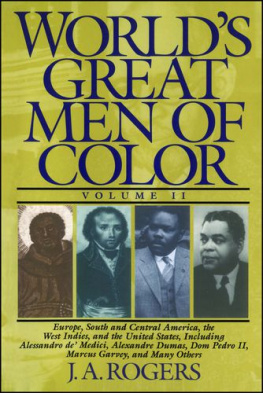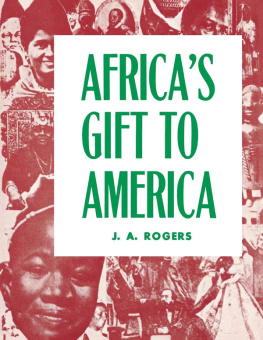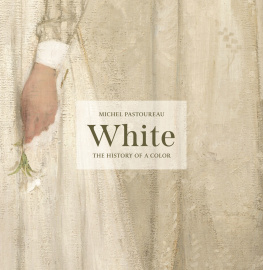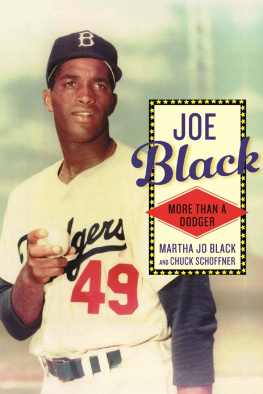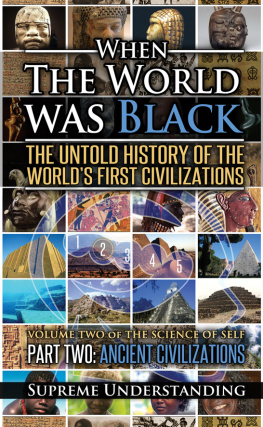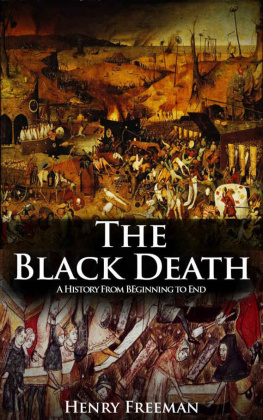
SCRIBNER
An Imprint of Simon & Schuster, Inc.r
1230 Avenue of the Americas
New York, NY 10020
www.SimonandSchuster.com
Copyright 1946 by Helga M. Rogers
Copyright renewed 1974 by Helga M. Rogers
Introduction and commentaries copyright 1972 by Macmillan Publishing Company,
a division of Macmillan, Inc.
Previously published in 1996 by Touchstone, an imprint of Simon & Schuster, Inc.
Worlds Greatest Men of Color was originally published in hardcover by J.A. Rogers and is reprinted in this revised edition by arrangement.
All rights reserved, including the right to reproduce this book or portions thereof in any form whatsoever. For information, address Scribner Subsidiary Rights Department, 1230 Avenue of the Americas, New York, NY 10020.
This Scribner trade paperback edition August 2020
SCRIBNER and design are registered trademarks The Gale Group, Inc., used under license by Simon & Schuster Inc., the publisher of this work.
For information about special discounts for bulk purchases, please contact Simon & Schuster Special Sales at 1-866-506-1949 or .
The Simon & Schuster Speakers Bureau can bring authors to your live event. For more information or to book an event, contact the Simon & Schuster Speakers Bureau at 1-866-248-3049 or visit our website at www.simonspeakers.com.
ISBN 978-0-684-81581-7
ISBN 978-1-4516-5054-9 (ebook)
Contents
Illustrations
Introduction
J. A. R OGERS devoted at least fifty years of his life to researching great black personalities and the roles they played in the development of nations, civilizations, and cultures. This book is his greatest achievement. In his lifetime his books did not reach a large popular reading audience. All of them were privately printed and circulated mainly in the black communities; he died, unfortunately, on the eve of the Black Studies Revolution. Mr. Rogers had already delivered what some of the radical black students were demanding. He had looked at the history of people of African origin, and had showed how their history is an inseparable part of the history of mankind.
A number of recent books have validated the early claims of J. A. Rogers, who started his research at a time when a large number of black people had some doubts about their contribution to human history. In books like Blacks in Antiquity by Frank M. Snowden, Jr. (1970), The African Genius by Basil Davidson (1969), The Prehistory of Africa by J. Desmond Clark (1970), Topics in West African History by A. Adu Boahen (1967), Introduction to African Civilizations by John G. Jackson (1970), and Great Civilizations of Ancient Africa by Lester Brooks (1971) these doubts are put to rest.
In a recent paper Professor Keith E. Baird calls attention to how and why Africa was lost from the respectful commentary of history. Until quite recently it was rather generally assumed, even among well-educated persons in the West, that the continent of Africa was a great expanse of land, mostly jungle, inhabited by savages and fierce beasts. It was unthought of that great civilizations could have been born in might and wisdom over vast empires. It is true that there were some notions current about the cultural achievement of Egypt, but Egypt was conceived of as a European land rather than as a country of Africa. Even if a look at an atlas or globe showed Egypt to be in Africa, then popular thought immediately saw in the Sahara desert a formidable barrier and a convenient division of Africa into two parts: one, north of the Sahara, was inhabited by a European-like people of high culture and noble history: the other, south of the Sahara, was inhabited by a dark-skinned people who had no culture, and were incapable of having done anything in their dark and distant past that could be dignified by the designation of history. Such ideas, of course, are far from the truth, as we shall see. But it is not difficult to understand why they persisted, and, unfortunately, still persist in one form or another in the popular mind.
Europeans have long been in contact with Africa, that is, Northern Africa. The names of Esop and Memnon, of Terence and Cleopatra are the names of Africans who have figured in the legend and literature, the arts and history of Greece and Rome. Indeed, the land of Africa was a land of wonders for the ancient Greeks and Romans, and this to such an extent that among them it was a proverb that out of Africa there is always something new. The concept of darkest Africa refers to the comparative ignorance of Europeans regarding that continent and its peoples over the last four centuries. An English writer, Jonathan Swift, made a sharp but witty comment on his fellow Europeans lack of knowledge of Africa when he wrote:
Geographers in Africa maps
With savage pictures fill their gaps,
And oer uninhabitable downs
Paint elephants instead of towns.
There is another reason why the people of Africa, with the notable exclusion of Egypt, were depicted as uncivilized and lacking in cultural attainments. A number of pious people in Europe would have been struck with horror if they knew of the cruel and blood acts of their country men in the course of the inhuman slave-trade. Ruthless European adventurers promoted the hunting down of men, women and children like beasts, and the destruction of complete villages in order to capture the inhabitants and sell them like cattle. Therefore, slave-traders would invent fantastic tales of savagery about the Africans so that their capture and their transportation to labor on the plantations of the Americans would appear to be acts of Christian concern and high minded enlightenment.
In the books of J. A. Rogers an attempt has been made to locate Africas proper place on the maps of human geography. That is what his life and research were about.
The distinguished Afro-American poet Countee Cullen began his poem Heritage with the question What is Africa to me? This book extends the question by asking, What is Africa to the Africans? and What is Africa to the world? This book also answers those questions.
In his monograph on The Significance of African History, the Caribbean-American writer Richard B. Moore observed:
The significance of African history is shown, though not overtly, in the very effort to deny anything worthy of the name of history to Africa and the African peoples. This widespread, and well nigh successful endeavor, maintained through some five centuries, to erase African history from the general record, is a fact which of itself should be quite conclusive to thinking and open minds. For it is logical and apparent that no such undertaking would ever have been carried on, and at such length, in order to obscure and to bury what is actually of little or no significance.
The prime significance of African history becomes still more manifest when it is realized that this deliberate denial of African history arose out of the European expansion and invasion of Africa which began in the middle of the fifteenth century. The compulsion was thereby felt to attempt to justify such colonialist conquest, domination, enslavement, and plunder. Hence, this brash denial of history and culture to Africa, and, indeed, even of human qualities and capacity for civilization to the indigenous peoples of Africa.
According to all of the evidence we now have, mankind started in Africa. In his book

